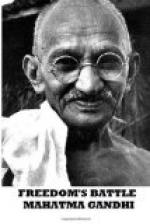His Excellency is, if possible, even less happy on the Khilafat. “So far as any Government could,” says this trustee for the nation, “we pressed upon the Peace Conference the views of Indian Moslems. But notwithstanding our efforts on their behalf we are threatened with a campaign of non-co-operation because, forsooth, the allied Powers found themselves unable to accept the contentions advanced by Indian Moslems.” This is most misleading if not untruthful. His Excellency knows that the peace terms are not the work of the allied Powers. He knows that Mr. Lloyd George is the prime author of terms and that the latter has never repudiated his responsibility for them. He has with amazing audacity justified them in spite of his considered pledge to the Moslems of India regarding Constantinople, Thrace and the rich and renowned lands of Asia minor. It is not truthful to saddle responsibility for the terms on the allied Powers when Great Britain alone has promoted them. The offence of the Viceroy becomes greater when we remember that he admits the justness of the Muslim claim. He could not have ‘pressed’ it if he did not admit its justice.
I venture to think that His Excellency by his pronouncement on the Punjab has strengthened the nation in its efforts to seek a remedy to compel redress of the two wrongs before it can make anything of the so-called Reforms.
FROM RIDICULE, TO—?
It will be admitted that non-co-operation has passed the stage ridicule. Whether it will now be met by repression or respect remains to be seen. Opinion has already been expressed in these columns that ridicule is an approved and civilized method of opposition. The viceregal ridicule though expressed in unnecessarily impolite terms was not open to exception.
But the testing time has now arrived. In a civilized country when ridicule fails to kill a movement it begins to command respect. Opponents meet it by respectful and cogent argument and the mutual behaviour of rival parties never becomes violent. Each party seeks to convert the other or draw the uncertain element towards its side by pure argument and reasoning.
There is little doubt now that the boycott of the councils will be extensive if it is not complete. The students have become disturbed. Important institutions may any day become truly national. Pandit Motilal Nehru’s great renunciation of a legal practice which was probably second to nobody’s is by itself an event calculated to change ridicule into respect. It ought to set people thinking seriously about their own attitude. There must be something very wrong about our Government—to warrant the step Pundit Motilal Nehru has taken. Post graduate students have given up their fellowships. Medical students have refused to appear for their final examination. Non-co-operation in these circumstances cannot be called an inane movement.
Either the Government must bend to the will of the people which is being expressed in no unmistakable terms through non-co-operation, or it must attempt to crush the movement by repression.




